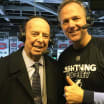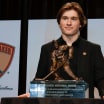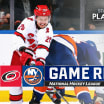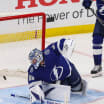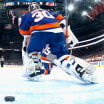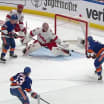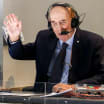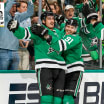NHL.com's Q&A feature called "Five Questions With …" runs every Tuesday. We talk to key figures in the game and ask them questions to gain insight into their lives, careers and the latest news.
The latest edition features Minnesota Wild assistant coach Scott Stevens:
Five Questions with Scott Stevens
Wild assistant coach discusses returning to bench, helping defensemen evolve
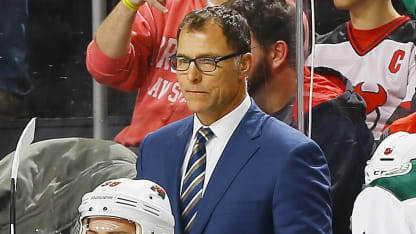
© Andy Marlin/Getty Images
Hall of Fame defenseman Scott Stevens gave up a cushy job talking and analyzing the game on NHL Network, a job that allowed him to live in his own house in New Jersey, so he could go back to the grind of the NHL season as an assistant coach with the Minnesota Wild.
It was and still is the best decision for Stevens, especially since he's played a role in helping the Wild become the best team in the Western Conference so far this season.
The Wild lead the Central Division and the Western Conference with 61 points and a .726 points percentage in 42 games. They carry a four-game winning streak into a game against Stevens' former team, the New Jersey Devils, at Xcel Energy Center on Tuesday (8 p.m. ET; FS-N, FS-WI, MSG+, NHL.TV).
Stevens will join Wild coach Bruce Boudreau and the rest of the staff next weekend in Los Angeles for 2017 Honda NHL All-Star Weekend, where they will coach the Central Division.
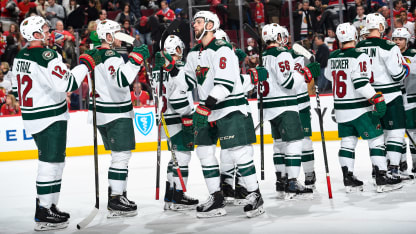
© Bill Smith/Getty Images
"It's fun to teach," Stevens said. "It's fun to be part of a team, preparing for games, preparing for the next team. You're right there. You're hands on. You're closer to the action. TV was fun. It was like you're teaching but you're teaching from afar, teaching an audience. It's just fun to be making decisions and in the heat of the battle."
In a way, though, spending last season as an analyst helped give Stevens a head start for his job with the Wild.
"You learn players. You see players. You also watch what teams do, how they play," he said. "How do they forecheck? How do they defend? What do they do in the neutral zone? What do you like? What don't you like? What could you use? What can you suggest to your new team? You look for things like that. You watch the teams you like and you watch the teams that have success and try to figure out what they do, how they had success, what they do well."
Stevens didn't watch Minnesota closely until he joined Boudreau's staff on June 7. He immediately sunk his eyes and hockey mind into the Wild and has since helped them become one of the best defensive teams in the League; the Wild are second in goals against per game (2.14) and sixth in penalty kill (84.9 percent). They allowed 2.49 goals per game and were 77.9 percent on the PK last season.
"The guys are good," Stevens said. "The guys come to play. That's the best part."
Stevens talked more about his guys and being back behind the bench during a phone conversation Monday.
Here are Five Questions (plus a bonus question at the end) with … Scott Stevens:
Let's go over the defense unit you have in Minnesota. What are some things you have learned about them now that you're coaching them, things you wouldn't pick up on by just watching them?
"You're fortunate to have a guy like Ryan Suter, a guy that's a horse, can play a lot of minutes. He's been valuable. He produces points. He plays against the best players. He plays 27 minutes. It's nice to have him back there because you know he comes to play every night and he's very consistent. His partner, a guy nobody ever talks about, Jared Spurgeon, is definitely a guy you should look at. He's not very big, but what a complement he is to Suter. I know he's going to get the job done. I can count on him. He's a right-hand shot, moves the puck well, defends well for a small guy, fearless, makes plays. A guy that should be talked about more in the League along with Ryan Suter.
"And then I go to Jonas Brodin. This guy here, he plays the left side but he's a guy I can put on the right side when I need to. I can move him around anywhere at any time. He's got great feet. He can beat a forecheck by himself and he defends very well. He's an excellent young hockey player. Matt Dumba has that potent shot, a threat on the power play. He joins the rush. He's still learning, getting better, but he's been very good. Marco Scandella had some injuries, but he's back and he's a big defenseman with a big reach and moves very well. He has a good stick and can be a shutdown defender. Christian Folin, this is really his first full year. He started out really well, got injured, but he's back now and playing well. He's a physical guy, boxes out in front of the net and leans on people.
"Then we have Nate Prosser, who is just a good team guy. He reminds me of [former Devils defenseman] Tommy Albelin, when you need a guy to come in as a seventh, you know what he's going to do, he gets the job done, never complains and is probably a favorite in the locker room with the guys.
"It's a great group with a little bit of everything, and they're all quite mobile, which is nice. You know in this day and age to have people with good feet and can move is very important."
This defense might not have the physical intimidation that the Devils defense had when you played in New Jersey, but does any of this blue line remind you of the defense you used to play with, at least in terms of how they play and how you can deploy them?
"Yeah. That's what Bruce Boudreau wants. As much of an offensive player he was, he knows how to defend. He knows defense wins and his track record shows it. That's one reason why I liked his system. I liked the way his teams play in the 'D' zone. I liked how his teams played in the neutral zone. It reminds me very much of the Devils in how we play. We definitely love to protect the middle of the ice. We might give up a few more shots, but we give up a lot of those perimeter shots and hopefully our goaltenders know where the shots are coming from. We don't give up many Grade A chances.
"The players play the right way. You have to give the players credit; they're a disciplined group. They like to win and they know how to button it down, protect a lead. They don't cheat and they make sacrifices. That's the biggest reason why we're having success."
Is this team better than you thought it was when you first got there?
"Yeah, yeah it is, but it took a little while at the start to figure the group out and for them to figure us out. We made some changes and it took time. There were some old habits from five or six years that they had been doing. It was a process. And then finding ways to score more goals, we had trouble at the start. We were defending well, but now we're scoring goals in different ways and we're getting contributions from different people and a lot of guys are having career years. When you get scoring that's spread out and you defend well, good things happen. I think this was a team that scored on the rush a lot in previous years, but Bruce has been driving it home for us to get pucks to the net and get people there, and we've been scoring a lot of goals in that blue paint area. It's nice to score in different ways, but to score in this League you have to get pucks to the net and people to the net."
The way you played the game was physical. You had a number of big, well-documented hits. Today if a guy lays a big hit, he most of the time has to answer for it right away, whether that's good or bad. There aren't as many of those big hits either, but it's a more mobile game. How have you had to evolve to be a coach in today's game?
"It's more position, body position and sticks. That's how the game has changed. It's a pressure game, taking time and space away. This is what the game has become. It's a faster game, more of a north-south game, but I still think the way you win and the way you play games hasn't really changed. I think those things are still there, but there's no question it's not as physical but it's still a demanding game."
I guess my point is I don't know that you can teach a guy to play the way you played and apply it in today's game. Do you agree?
"Oh yeah. I think some people have the illusion that when I become a coach now the defense is going to be this ferocious, hard hitting, feared team. No. It's in your blood. It's in your DNA. You have to like physical contact and want to play that game. You can push people into certain areas to be a little more physical and a little more aggressive, but it's got to be in the person."
It's time to play the Devils again. You did it once in New Jersey on Oct. 22 and now you get to do it in Minnesota. What was that feeling like the first time you coached against them and what do you expect Tuesday?
"It was tough. It was different. I don't think I ever saw the locker room on the other side in that building [Prudential Center]. It was definitely a little awkward. It was good to get it over. But it was nice to see some of the old faces that have been around there. There's a great bunch of guys over there. Andy Greene, Adam Henrique, Travis Zajac, a lot of good people I coached and was around. Another guy like Cory Schneider too. We'll see about [Tuesday]. We want to win and they're playing much better hockey now. We'll have our hands full."

